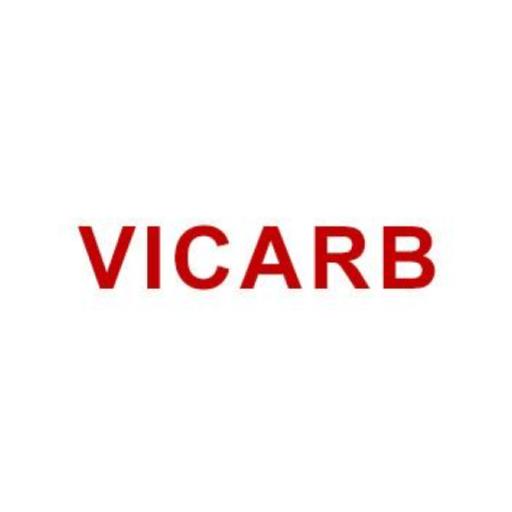VICARB GASKETS
100% COMPATIBLE
Modern’Gaskets provides a comprehensive range of high-quality, compatible gaskets specifically designed for Vicarb plate heat exchangers. Our gaskets are crafted to ensure a perfect fit and dependable sealing, helping to extend the lifespan of your equipment and maintain its optimal performance.
| Range | References |
|---|---|
| V | V2 - V4 - V7 - V8 - V13 - V20 - V28 - V45 - V55 - V60 - V85 - V100 - V110 - V120 - V130 - V180 - V260 |
| VU | VU8 - VU12 |
NBR (Nitrile Butadiene Rubber) is a versatile material used in the gaskets offered by Modern’Gaskets, known for its excellent resistance to animal and vegetable oils, fats, and aliphatic solvents. This makes it an ideal choice for applications where exposure to these substances is common. NBR’s properties ensure a reliable and durable seal, enhancing the performance and longevity of plate heat exchangers.
Pros:
- Chemical Resistance: NBR gaskets excel in environments where they come into contact with oils, fats, and aliphatic solvents, maintaining effective sealing and preventing leaks.
- Mechanical Strength: The material offers high tensile strength and flexibility, ensuring durability and a consistent seal even under pressure and temperature fluctuations.
- Versatility: Suitable for a wide range of applications, NBR gaskets can be used in various industrial settings, from food processing to automotive and marine industries.
Cons:
- Temperature Limits: NBR has limitations in extremely high or low temperatures, which may affect its performance in very hot or very cold environments.
- Ozone and Weathering Sensitivity: Prolonged exposure to ozone and certain environmental conditions can degrade NBR, potentially compromising gasket integrity over time.
- Not Ideal for All Chemicals: While resistant to many substances, NBR is not suitable for exposure to strong acids, ketones, or chlorinated solvents, which can lead to swelling or deterioration.
EPDM (Ethylene Propylene Diene Monomer) is a high-performance elastomer featured in the gaskets offered by Modern’Gaskets, known for its exceptional resistance to steam, polar solvents such as water, ketones, and alcohols. This makes EPDM an excellent choice for applications involving exposure to these substances, providing reliable sealing and durability in a wide range of industrial environments.
Pros:
- Superior Chemical Resistance: EPDM gaskets are highly resistant to steam, polar solvents, water, and a variety of acids, including non-mineral acids, ensuring effective sealing and long-lasting performance.
- Temperature Stability: EPDM performs well across a wide temperature range, maintaining flexibility and resilience in both high and low-temperature environments.
- Ozone and Weather Resistance: This elastomer exhibits excellent resistance to ozone, weathering, and UV exposure, making it suitable for outdoor and harsh environmental applications.
Cons:
- Limited Oil Resistance: EPDM is not suitable for environments where there is significant contact with oils, fuels, or hydrocarbons, as it can degrade or lose its sealing properties.
- Lower Mechanical Strength: Compared to some other elastomers, EPDM may have lower tensile strength, which can affect its performance in high-pressure applications.
- Not Ideal for All Solvents: While resistant to many chemicals, EPDM may not be suitable for certain chlorinated or aromatic solvents, which can cause degradation or reduced effectiveness.
HNBR (Hydrogenated Nitrile Butadiene Rubber) is a robust elastomer featured in the gaskets offered by Modern’Gaskets, known for its excellent performance at high temperatures up to 150-160°C. It is particularly well-suited for applications involving chemically aggressive oils and greases, providing a reliable and durable sealing solution in demanding environments.
Pros:
- High-Temperature Resistance: HNBR gaskets maintain their integrity and performance at elevated temperatures, up to 150-160°C, making them ideal for high-temperature applications.
- Chemical Resistance: This material excels in environments with exposure to chemically aggressive oils and greases, offering superior durability and sealing performance.
- Mechanical Strength: HNBR provides excellent tensile strength and resilience, ensuring a reliable seal under pressure and thermal stress.
Cons:
- Limited Steam Resistance: HNBR exhibits low resistance to steam, which can lead to rapid hardening and reduced gasket effectiveness in steam applications.
- Temperature Extremes: While effective at high temperatures, HNBR may not perform as well in extremely low temperatures, affecting flexibility and sealing properties.
- Potential for Degradation: Extended exposure to certain chemicals and environmental conditions can lead to material degradation over time, impacting gasket longevity.
FKM (Fluorocarbon Elastomers) are highly advanced materials used in the gaskets offered by Modern’Gaskets, renowned for their exceptional resistance to aggressive fluids. Available in various types (A, B, G), FKM elastomers are among the most durable rubbers, providing superior sealing solutions for challenging industrial environments.
Pros:
- Exceptional Chemical Resistance: FKM gaskets offer outstanding resistance to a wide range of aggressive fluids, including acids, bases, and hydrocarbons, ensuring reliable performance in harsh chemical environments.
- High-Temperature Stability: These elastomers perform well at high temperatures, maintaining their integrity and sealing capabilities in elevated heat conditions.
- Long-Term Durability: FKM gaskets exhibit excellent resistance to aging, ozone, and weathering, contributing to their longevity and consistent performance over time.
Cons:
- Cost: FKM elastomers are typically more expensive compared to other rubber materials, which may affect the overall cost of gasket solutions.
- Limited Low-Temperature Flexibility: While effective at high temperatures, FKM may have reduced flexibility at extremely low temperatures, impacting its performance in cold environments.
- Swelling in Certain Chemicals: Despite their broad chemical resistance, FKM gaskets can swell or degrade when exposed to certain specific chemicals, requiring careful consideration of the operating environment.
Elastomer for all applications
Each application requires a specific type of elastomer. When submitting your request via email, please provide details such as the product or fluid, operating temperatures, and other relevant conditions.
All our gaskets are produced using peroxide-based processes and fully comply with FDA standards (21CFR177.2600).
Modern’Gaskets adheres to FDA regulations as a benchmark, aligning with the EC1935/2004 standard for gasket materials used in plate heat exchangers.
- Large and Small Electric Motors
- Generators
- Ballasts
- Transformers

